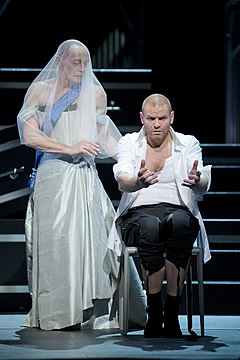Lear (opera)
| Lear | |
|---|---|
Opera by Aribert Reimann | |
 Erwin Leder as the Fool and Bo Skovhus as Lear in a 2012 production at the Hamburg State Opera | |
| Librettist | Claus H. Henneberg |
| Language | German |
| Based on | King Lear by William Shakespeare |
| Premiere | 9 July 1978 (1978-07-09) National Theatre Munich |
Lear is an opera in two parts with music by the German composer Aribert Reimann, and a libretto by Claus H. Henneberg, based on Shakespeare's tragedy King Lear.
Contents
1 Background and performance history
2 Roles
3 Instrumentation
4 Recordings
5 References
Background and performance history
Reimann wrote the title role specifically for the baritone Dietrich Fischer-Dieskau, who had suggested the subject to the composer as early as 1968. Reimann then received a commission from the Bavarian State Opera in 1975. The world premiere, in a production by Jean-Pierre Ponnelle with Fischer-Dieskau in the title role, occurred at the National Theatre Munich on 9 July 1978, with Gerd Albrecht conducting.[1]
The production was revived in Munich in 1980.[2] The US premiere, in English translation, was presented by the San Francisco Opera in June 1981, with Thomas Stewart as Lear, under Gerd Albrecht.[3][4] The Paris premiere took place in November 1982, in a French translation by Antoinette Becker.[5] The UK premiere was presented by English National Opera in 1989.,[1] while the Swedish premiere took place at the Malmö Opera on 27 April 2013.
Roles
One notable departure from operatic convention was to make the part of Lear's Fool a speaking role, rather than a sung role. In addition, compared to the Shakespeare original, the parts of Kent and Edmund, for example, have been greatly reduced.[1]
| Role[6] | Voice type[6] | Premiere cast 9 July 1978[7] (Conductor: Gerd Albrecht) |
|---|---|---|
| Lear | baritone | Dietrich Fischer-Dieskau |
| Fool | spoken role | Rolf Boysen |
Goneril, daughter of Lear | dramatic soprano | Helga Dernesch |
Regan, daughter of Lear | soprano | Colette Lorand |
Cordelia, daughter of Lear | soprano | Júlia Várady |
| Duke of Albany | baritone | Hans Wilbrink |
| Duke of Cornwall | tenor | Georg Paskuda |
| King of France | bass-baritone | Karl Helm |
| Duke of Gloucester | bass-baritone | Hans Günter Nöcker |
| Edgar, son of Gloucester | tenor/countertenor | David Knutson |
Edmund, illegitimate son of Gloucester | tenor | Werner Götz |
| Earl of Kent | tenor | Richard Holm |
| Servant | tenor | Markus Goritzki |
| Knight | spoken role | Gerhard Auer |
| Chorus: servants, guards, soldiers, Lear's and Gloucester's retinue | ||
Instrumentation
The orchestral score requires:[6]
- 3 flutes (all doubling piccolo), alto flute, bass flute, 3 oboes, English horn, 2 clarinets, bass clarinet, 2 bassoons, contrabassoon
- 6 horns, 4 trumpets, 3 trombones, tuba
percussion6, 2 harps
strings: 24 violins, 10 violas, 8 cellos, 6 double basses
Recordings
- 1978: Dietrich Fischer-Dieskau, Karl Helm, Hans Wilbrink, Georg Paskuda, Richard Holm, Hans Günter Nöcker, David Knutson, Werner Götz, Helga Dernesch, Colette Lorand, Júlia Várady, Rolf Boysen, Markus Gortizki, Gerhard Auer; Bavarian State Orchestra, Chorus of the Bavarian State Opera; Gerd Albrecht, conductor. Deutsche Grammophon 463 480-2 (CD reissue)[8][9]
- 2008: Wolfgang Koch, Magnus Baldvinsson, Dietrich Volle, Michael McCown, Hans-Jürgen Lazar, Johannes Martin Kränzle, Martin Wölfel, Frank van Aken, Jeanne-Michèle Charbonnet, Caroline Whisnant, Britta Stallmeister; Frankfurter Opern- und Museumsorchester, Chorus of the Frankfurt Opera, Sebastian Weigle, conductor. Oehms Classics OC 921[10]
References
Notes
^ abc Graeme, Roland (2001). "Lear. Aribert Reimann". The Opera Quarterly. 17 (1): 158–161. doi:10.1093/oq/17.1.158. Retrieved 2007-09-06..mw-parser-output cite.citation{font-style:inherit}.mw-parser-output .citation q{quotes:"""""""'""'"}.mw-parser-output .citation .cs1-lock-free a{background:url("//upload.wikimedia.org/wikipedia/commons/thumb/6/65/Lock-green.svg/9px-Lock-green.svg.png")no-repeat;background-position:right .1em center}.mw-parser-output .citation .cs1-lock-limited a,.mw-parser-output .citation .cs1-lock-registration a{background:url("//upload.wikimedia.org/wikipedia/commons/thumb/d/d6/Lock-gray-alt-2.svg/9px-Lock-gray-alt-2.svg.png")no-repeat;background-position:right .1em center}.mw-parser-output .citation .cs1-lock-subscription a{background:url("//upload.wikimedia.org/wikipedia/commons/thumb/a/aa/Lock-red-alt-2.svg/9px-Lock-red-alt-2.svg.png")no-repeat;background-position:right .1em center}.mw-parser-output .cs1-subscription,.mw-parser-output .cs1-registration{color:#555}.mw-parser-output .cs1-subscription span,.mw-parser-output .cs1-registration span{border-bottom:1px dotted;cursor:help}.mw-parser-output .cs1-ws-icon a{background:url("//upload.wikimedia.org/wikipedia/commons/thumb/4/4c/Wikisource-logo.svg/12px-Wikisource-logo.svg.png")no-repeat;background-position:right .1em center}.mw-parser-output code.cs1-code{color:inherit;background:inherit;border:inherit;padding:inherit}.mw-parser-output .cs1-hidden-error{display:none;font-size:100%}.mw-parser-output .cs1-visible-error{font-size:100%}.mw-parser-output .cs1-maint{display:none;color:#33aa33;margin-left:0.3em}.mw-parser-output .cs1-subscription,.mw-parser-output .cs1-registration,.mw-parser-output .cs1-format{font-size:95%}.mw-parser-output .cs1-kern-left,.mw-parser-output .cs1-kern-wl-left{padding-left:0.2em}.mw-parser-output .cs1-kern-right,.mw-parser-output .cs1-kern-wl-right{padding-right:0.2em}
^ Marker, Frederick J., "Theatre in Review: Lear (Aribert Reimann)" (March 1981). Theatre Journal, 33 (1): pp. 112–114.
^ John Rockwell (17 June 1981). "Lear by Aribert Reimann". The New York Times. Retrieved 2007-09-06.
^ Michael Walsh (29 June 1981). "Three Premieres, Three Hits". Time. Retrieved 2007-09-13.
^ Lieblein, Leanore, "Theatre Review" (Périclès, Prince de Tyr / Lear) (May 1983). Theatre Journal, 35 (2): pp. 262–263.
^ abc "Aribert Reimann – Lear". Schott Music. Retrieved 9 October 2010.
^ Casaglia, Gherardo (2005). "Lear, 9 July 1978". L'Almanacco di Gherardo Casaglia (in Italian).
^ Griffiths, Paul, Review: "Reimann. Lear" (1980). The Musical Times, 121 (1644): p. 107.
^ "On-line catalogue entry Reimann – Lear – Albrecht". Deutsche Grammophon. Retrieved 9 October 2010.
^ "On-line catalogue entry Aribert Reimann – Lear". Oehms Classics. Retrieved 9 October 2010.
Sources
Holden, Amanda (Ed.), The New Penguin Opera Guide, New York: Penguin Putnam, 2001.
ISBN 0-14-029312-4
